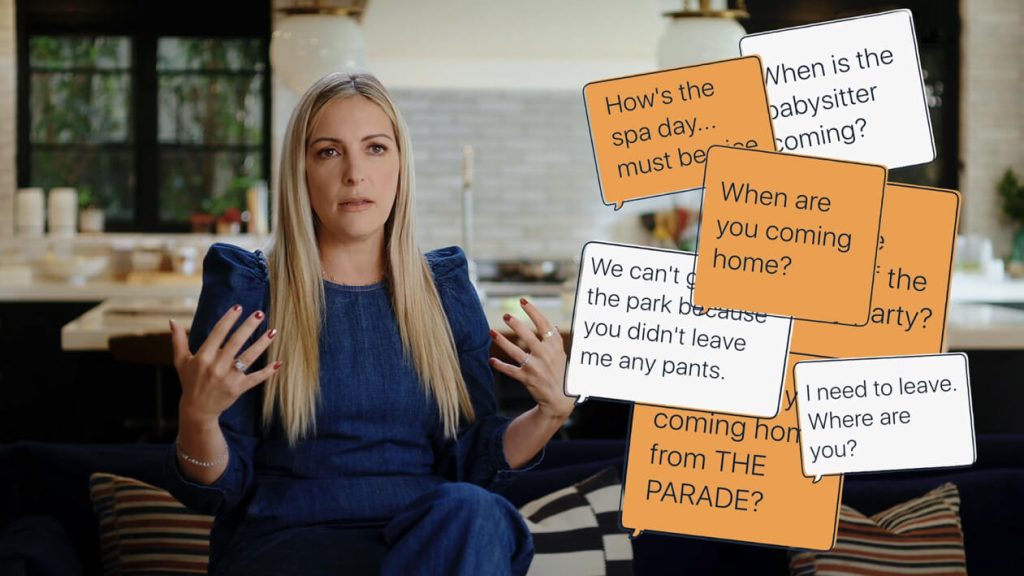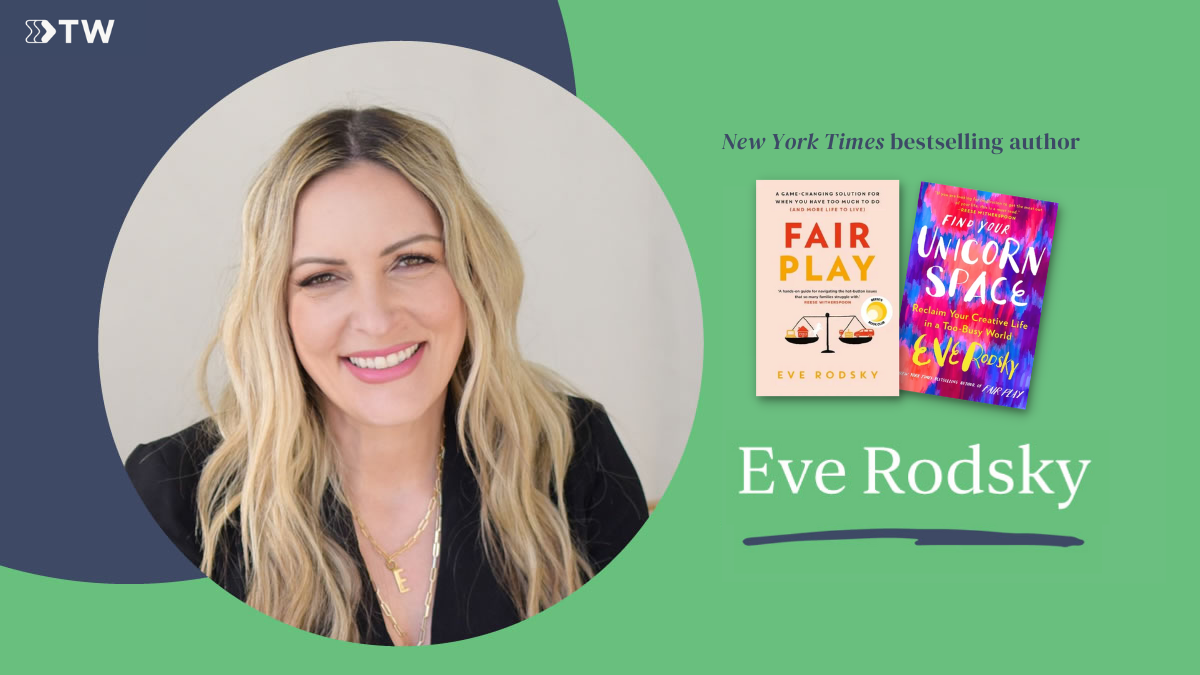IWD2023: Eve Rodsky on Equality vs Equity
By Nicky Champ
When we saw this year’s International Women’s Day theme, Equality vs Equity, we knew we had to dip into our contact book and speak to Eve Rodsky. We love her work, and often refer her book to our clients managing the messy intersection of life and work.
For the uninitiated, Eve Rodsky is a New York Times bestselling author and expert in organisational management. She’s made it her mission to help individuals and couples achieve a more equitable distribution of labour at home. Her book, Fair Play, has become a game-changing resource for couples looking to reclaim their time, rediscover their values, and prioritise their happiness. Through her research, Eve has developed a system for managing household tasks and responsibilities in a fair and effective way. Her work in gender equality and work-life balance not only focuses on the homefront but empowers individuals and families to create more fulfilling and equitable lives in the workplace too.
We spoke with Eve in the lead-up to International Women’s Day. Read on for our full interview…
Eve on why equal opportunities are no longer enough
Women are the litmus test for every society. They’re the canary in the coal mine. And we know equal opportunities, or what people have perceived as equal opportunities, has not been enough. There is no understanding that nothing can be equal for women when they don’t have control of their own time.
And so, people are looking at equal opportunities like we give women equal opportunities to enter professional fields. We give them equal opportunities to go to colleges that were reserved for men up until the 1960s and ’70s. So, I think the generation before us thought that the access to those institutions and access to opportunities were going to fix the gender wealth gap.
But what we’ve found is that we’re still 200 years away from closing any equity or equality pay gap, or any gap at all, to be honest. And I believe that’s because we’ve been looking at it as quality of opportunity, and that’s never going to be enough. We have to look at completely changing the gender norms of how we socialise men. It’s really not about women anymore. It’s really about men.
On navigating the mental load during life and career transitions
I think this is the beauty of the equity versus equality conversation. What was happening in the 90s was when people realised that there was a second shift. There was a move towards what was called ‘equally shared parenting’ and equally shared housework. And that was a really strange phenomenon to me, because it was like, “You do garbage one day, I do garbage the next day. You take the car in one day, so next time I take the car in. You do bath time one day, so I do the next day.” To me, it was this epic long list of spreadsheet tasks, and I knew that’s not how we create healthy organisations.
What we know builds healthy organisations is a secret formula of boundaries, systems, and communication. And so when I realised that the home was just another organisation, and I realised that it didn’t have to be equal. That a shift worker could do the system, because I’m not telling you how to live your life. What I’m telling you is that you deserve healthy boundaries that each of you agrees that an hour holding a child’s hand in the pediatrician’s office is as valuable as an hour in a boardroom. That you implement systems, even if one person holds one unpaid labour card and the other person holds 99. Running a household is not a one person job. My mother can attest to that as a single mother, where everything fell through the cracks.

On 50/50
On an individual level, when you’re asking about equity, I’m not telling you it has to be 50/50. I want to burn 50/50, because I think that that completely disregards our life and our work. People today work longer hours or do shift work and we have to recognise that we can’t live in a situation of assumptions anymore. We have to structure our decision making when it comes to equity. Even if you’re still the one who ends up still holding all the unpaid labour cards, I want the person in that relationship to have actively chosen that status, as opposed to have gotten there through assumption.
On being the default or ‘shefault’ parent
This is a real issue. When you speak about women’s equity, I want to say that women become complicit in their own oppression. Because a lot of these equity conversations are also not happening because women say poor things to themselves. They say “It’s me. I can’t re-divide unpaid labour in my home because of my partner,” especially in a hetero cisgender partner. “Or my partner makes more money than me. Or my job is more flexible.”
Well, we found in our studies that if a woman is a lawyer and a man’s a doctor, she says her job is more flexible. If you flip it and she’s the doctor and he’s the lawyer, guess what? She says her job is more flexible. There’s just such a different expectation over how women are supposed to use their time that we become so conditioned to spending our time in service of others that we give away our most valuable currency, our time, for free.
Women no longer can be the social safety net of any society. There’s not one society that we can find where men do more unpaid labour than women.
On ‘playing it fair’
The home is the last frontier of inequity because we have literally decided that we will not think about the home. That we will not invest any energy in the home, that we will not have any boundaries around the home, that we’ll not have any communication around the home, that we’ll have no system around the home. And so, of course, it’s going to be a sh*t show.
So the amount of decision fatigue and the amount of time wasted because we don’t have these conversations is how I can convince people that it’s worthwhile and if they say they don’t need help at home. Because everybody wants more time back. We’re in a very busy world, and time is our most valuable currency. And I’m telling you that implementing boundary assistance and communication will get you time back.
And so it’s my gift to everybody to say, have these conversations now. Whether it’s with a roommate, kids, your partner, because running a home is the foundation for being able to have a successful life. It’s executive function. It’s what we want to teach our kids.
On unpaid labour at work
Well, I think for women it’s actually very important to see what the family structure of their boss is like at home. If their boss is a man or a woman who has a stay-at-home partner, it’s going to be a lot harder for that person to find equity at work. That’s what I’ve found in the research, because that person, as empathetic as they are, has a free lane to focus fully on work and somebody else is handling everything off-screen. So if it’s a red flag if you’re working for somebody with a stay-at-home partner. That leader has to be really intentional about equity in the workplace, if that’s their family structure.
The other piece of advice is to normalise it. To say that, ‘you are a woman and you’ve been told you can do anything, but you’ve never been told that you’re also going to be asked to do everything’. I want to normalise that for women to say. It’s not your fault that you’re being asked to order the boss’s birthday cake. There’s a rocket scientist at a big company who told me she’s in charge of picking up the linoleum tiles to their new headquarters, because she has, and I quote, “good style”.
I think it’s really important for all women to recognise that we have to also put systems in place at work to make sure we’re not the only ones trying to get out of unpaid labour. And that requires a real intentionality. To protect boundaries around women’s time and marginalised people’s time, we need systems in place. So if you ordered a boss’s birthday cake one time or planned the office party, then it just goes on the next person on the list and whose turn it is next.
And then, of course, communicate to your leaders to understand how, if you have to deal with that unpaid labour, it will go into your growth plan or to your performance plan.
On staying motivated to fight the good fight
Oh my gosh. I’d say it’s because we know that if we don’t interrupt with these patterns now, then we continue, and we will never ever break the cycle. And so I feel like a cycle breaker. I’m not saying it’s going to happen to everybody, but I think even if I can affect a couple of people’s lives where they say that their marriage has changed, I know that that will have reverberations. Because there are many sociologists, including one named C Wright Mills who had a really beautiful saying that, “Private lives are public troubles.” I’ve changed it to “Private lives are public issues.”
And to me, this last frontier of feminism, this idea that we are ‘care’ feminists, that we can work together, that you and I, as women, will always understand each other’s lives. Because at some point in our lives, you and I both will be defined by our roles and not who we are as individuals. I feel like that’s the unity that will hopefully change things.
Find out more about Eve, her books, Fair Play: A Game-Changing Solution for When You Have Too Much to Do and Find Your Unicorn Space: Reclaim Your Creative Life in a Too-Busy World, and the Fair Play documentary, visit Eve’s website.



